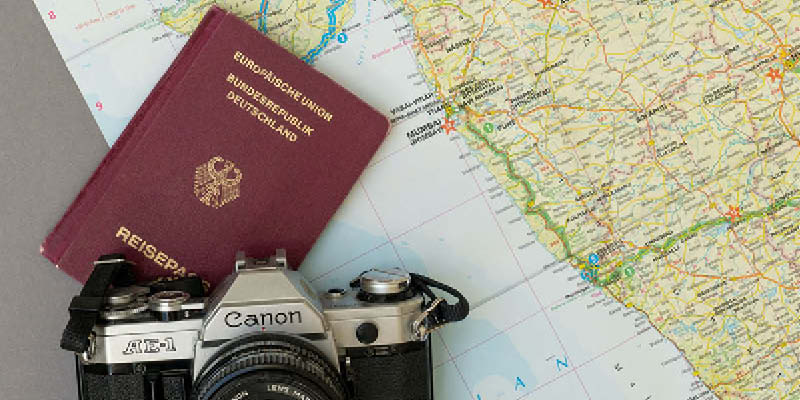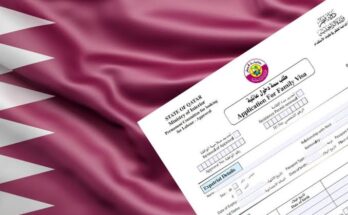Germany Student Visa Requirements: The number of foreign people choosing Germany for their abroad studies is increasingly growing each year. Most international students will likely need to get a German student visa at a German consulate in their country before they can come to Germany to study.
Depending on the country you come from, you might be exempt from needing a visa to study in Germany, but you are still required to obtain a residence permit for studies lasting more than 90 days, once you arrive in Germany.

Types of Germany Study Visas
You may be issued a German visa for studies for a range of study levels and degrees. This includes undergraduate, exchange, graduate, or postgraduate studies. This also covers participation in a pre-academic measure or in a non-academic German language course.
There are three types of German student visas you can apply for:
- German Student Visa. This is the standard student visa for international students who have been admitted to one of the official universities in Germany and are ready to start their studies in a university program in Germany.
- German Student Applicant Visa. You need this visa if you need to be in Germany to apply for university admission in person. This visa doesn’t allow you to study in Germany, it’s only valid for the university application process.
- German Language Course Visa. You need this type of visa to study for a German language course in Germany.
German Student Visa Requirements
The most important requirements during your Germany student visa process are:
- Visa Application Documents.
- Duly filled out and signed the national visa application form.
- Your valid national passport.
- Two photocopies of your passport.
- Your certificate of birth.
- Your marriage certificate. (If applicable).
- Your child’s certificate of birth. (If applicable).
- Your recent passport-style photographs. (Up to 3).
- Photocopies of previous German residence titles. (If applicable).
- Proof of Financial Resources “Finanzierungsnachweis”. (One of the following)
- €10,332 deposit confirmation at a German blocked bank account.
- Letter of commitment and evidence of your parent’s income records and financial assets.
- Letter of commitment by a German resident “Verpflichtungserklärung”. This letter is taken at the Alien’s Registration Office, by the German resident whose going to cover your costs during your studies.
- Scholarship awarding certificate. It must show the number of costs it covers.
- Bank guarantee. Issued to you by a recognized German bank.
- Proof of University Admission.
- Confirmation of admission in studies “Zulassungsbescheid”. Issued by a recognized higher education provider in Germany, showing when you’re starting your studies and the language of teaching.
- Proof of conditional admission “Bedingter Zulassungsbescheid” and a confirmed intensive course “Intensiv-Sprachkurs”. The letter must show you’re conditioned and confirmed to participate in an intensive language course before getting the final university admission. The course must last more than 6 months, with not less than 18 hours of lessons in a week.
- Proof of conditional university admission.
- Letter from “uni-assist”.
- Confirmation of admission as an applicant.
- Communication with the university, regarding conditions for final admission.
- Proof of having paid for the language course. Accompanied by a confirmed place in the course. The payment must cover at least 3 first months.
- Proof of conditional university admission.
- Confirmation of admission in a university preparatory course “Studienkolleg”.
- Proof of conditional university admission.
- Letter from “uni-assist”.
- Confirmation of admission as an applicant.
- Communication with the university, regarding conditions for final admission.
- Proof of having been confirmed as a participant in the course.
- Proof of conditional university admission.
- Evidence of your earlier education.
- Original school-leaving certificate.
- Degree certificate. (If you’re entering Master’s or Ph.D. studies).
- Student Health Insurance.
- University entrance qualification.
- Certificate of German or English Language Proficiency.
How to Apply For A German Student Visa?
The German student visa application process can be confusing process for many international students. The procedures are different from country to country, but you can have a general overview of the main steps you need to go through below.
Here are the steps to applying for a German Student Visa:
- Locate The Closest German Embassy or Consulate. You can use Google to search for an embassy or a consulate near you, in your country (or another country close to you) to get more information about the requirements and set up a visa appointment. All official German missions in other countries have an official website online, along with their physical address and contact information.
- Review The Requirements and Procedures. Once you find the German embassy website, you go to the student visa sections to review all the specific requirements for your country and the procedures to set up a visa appointment. Make sure you carefully review all the information provided (especially the documents you need to have) before you set up a visa appointment.
- Set Up A Visa Appointment. When you’re ready, you should set up a visa appointment by following the steps described on the official website of the German embassy in your country. In some countries, you should apply for your visa appointment a few weeks ahead of time as that particular embassy could have many visa applications and they could take a longer time to get to you. Timing is very important, sometimes all student visa interview slots can be taken, so make sure you act fast.
- Have All Of The Visa Application Documents Ready. Once you have your visa appointment date confirmed, you should double-check all of your documents to make sure you have everything together. You can do this yourself and you don’t need to pay any outside consultants or agencies to apply for you.
- Prepare For Your Visa Interview. You should pay the visa application fee (€60.00 – €75.00) and have the payment confirmation with you at the time of your visa interview. This fee is non-refundable if your visa is rejected. You need to verify the exchange rate of your country’s currency and pay the exact amount. You should prepare yourself in advance for your interview. Here are some of the most common student visa interview questions and answers. After the interview is done, you will get the official answer whether your visa has been approved or rejected.
When To Apply For a German Student Visa
The best time to apply for a German student visa is immediately after receiving the university letter of admission and securing the necessary funds to live and study in Germany.
This is one of the most important requirements and if you haven’t been awarded an official scholarship, you need to provide proof of financial resources through other means such as having the funds deposited in a German blocked account.
How much bank balance is required for a German study visa?
As of 2021, the amount you need in your blocked bank account before applying for a German student visa is €10,332.
Germany Student Visa Processing Time
On average, it takes up to 25 days for your German student visa application to be processed. The processing time varies depending on the country and the German embassy you apply to.
All other German visa applications for studies are normally processed within 3 months.
German Student Applicant Visa
A German student applicant visa is the visa to apply for if you are planning to go to Germany to apply for university admission in person.
This visa is initially issued for three months but can be extended for another six months upon your arrival in Germany if necessary.
If in six months you receive the awaited letter of admission to a full-time university study program or a university preparatory measure you’ll be able to switch to a German student visa or a residence permit for studying.


